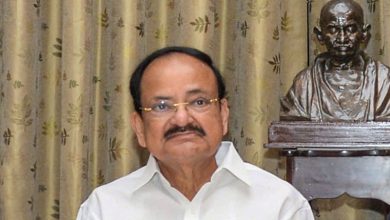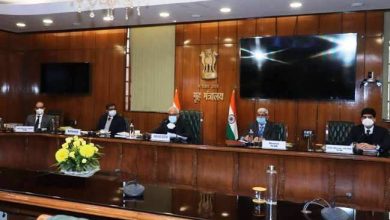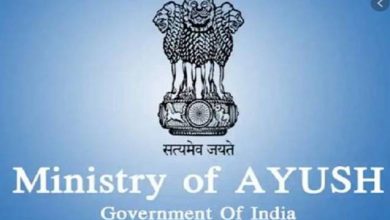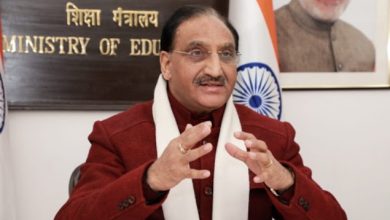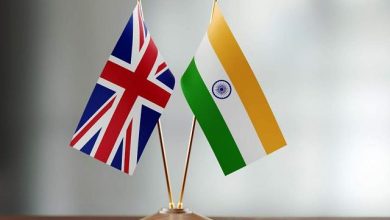Rashtrapati Bhavan Hosts Conference of Directors of IITs, NITs and IIEST
New Delhi: Rashtrapati Bhavan hosted the conference of Directors of IITs, NITs and IIEST, Shibpur. Apart from the Directors of 23 IITs, 31 NITs and IIEST, Shibpur, it was attended by the Union Minister for Human Resource Development, Minister of State in the Ministry of Human Resource Development, Secretary (Higher Education), Secretary, Department of Science and Technology and Chairman AICTE.
Speaking at the concluding session, the President of India, Shri Ram Nath Kovind, said this is that time of the year when the air quality of the national capital as well as of many other cities worsens beyond all norms. We are facing a kind of challenge here that we have never faced before. Hydrocarbon energy changed the face of the world in the last couple of centuries, but now it is threatening our very existence. The challenge is compounded for nations battling to bring substantial sections of populations out of poverty. Yet, we will have to find alternatives.
The President said that many scientists and futurologists have painted doomsday scenarios. On days of smog and poor visibility in our cities, we fear the future might already be here. He expressed confidence that institutions like IITs, NITs with their various specialisations, would take care to create a sensitivity and awareness among students and researchers towards our common future.
The President said that our government has made focused efforts to improve India’s ranking on the Ease of Doing Business Index, and now it aims to improve the Ease of Living for all citizens. From the technology perspective, he expressed confidence that institutions like IITs, NITs can make the most crucial contribution to Ease of Living for all citizens. He said that improving urban infrastructure, making water supply systems efficient, making healthcare delivery more effective – there are countless ways technology can make dramatic difference in the life of an average Indian.
This Conference is part of regular interactions of the President with such institutions in his capacity as visitor to 152 Central Universities and institutions of higher learning.
- I welcome you all, the directors of 23 Indian Institutes of Technology, 31 National Institutes of Technology, and the Indian Institute of Engineering, Science and Technology, to the Rashtrapati Bhavan.
- As every year, I am glad to interact with you, since you head the most eminent institutions of technology which have contributed immensely to the nation-building. I appreciate the quest for excellence displayed by each of you. The nation depends on you in its progress towards a better, more equitable future. If knowledge is power, you have all the power in the world to raise the curve of India’s journey.
- During our annual interaction, I look forward to hearing from you, about your great knowledge hubs, about the dreams and aspirations of the cream of India’s youth there, and about challenges ahead. I feel glad when I hear about the exceptional achievement of the institutions you lead, about your improvement in national and international rankings.
- We have had presentations today by institutes who have talked about various steps that can be taken to improve rankings. These ranking may seem to be mere numbers, but they are important as they indicate your progress on various critical parameters. My congratulations to all those institutes who have appeared high on the ranking. I hope that the others can learn from their experiences and adopt some of the best practices that have been highlighted. I expect that there will be a more healthy competition amongst you to do better next year.
- Science and technology become more humane when there are more women practitioners. I am happy to learn that your institutes have been striving to improve the gender ratio. I have been trying to increase the number of women Visitor nominees in your various committees. However, the number of women faculty in your institutes is still very low. I am sure this issue will get the attention it deserves from all of you.
- Along with more women faculty members, we also need more faculty with international experience. Although some progress has been made by your institutes, a lot more needs to be done. This is an area which needs to have more focussed efforts from every one.
- Last month I had the opportunity to launch the endowment fund of one of the institutes present here today. I hope to see the other institutes also similarly engage their alumni in their activities. Your alumni are important stakeholders in building your institute and they should be made to feel part of your growth story.
- You must also pay attention to the next generation of leaders in your institutes. It is essential that you groom competent administrators who will be able to continue to provide the vision and leadership that you are providing right now. This is not an easy task but necessary steps in this direction have been taken by the ministry with the Leadership for Academicians or LEAP programme. I am happy to note that the second edition of this programme was launched a couple of months ago by the Human Resources Minister.
- I see you ably carrying forward the legacy of our great institution builders like Vikram Sarabhai, Homi Bhabha and Satish Dhawan. Sarabhai not only created numerous great institutions of learning in the sphere of both pure science and technology, but also made them part of the society. An industrialist himself, he created linkages between research and industry, between science and society.
- Today, I wish to discuss with you the bridges between your eminent institutes and the society they are part of. I will be happy if you view this exercise in the spirit of dialogue.
- This is that time of the year when the air quality of the national capital as well as of many other cities worsens beyond all norms. We are facing a kind of challenge here that we have never faced before. Hydrocarbon energy changed the face of the world in the last couple of centuries, but now it is threatening our very existence. The challenge is compounded for nations battling to bring substantial sections of populations out of poverty. Yet, we will have to find alternatives.
- Many scientists and futurologists have painted doomsday scenarios. On days of smog and poor visibility in our cities, we fear the future might already be here. I am sure that your institutes, with your various specialisations, will take care to create a sensitivity and awareness among students and researchers towards our common future.
- Our government has made focused efforts to improve India’s ranking on the Ease of Doing Business Index, and now it aims to improve the Ease of Living for all citizens. How can we move forward in that direction, and make life easier for all, especially those on the margins of society? Later this week, Governors of states will be here in Rashtrapati Bhavan and this will be one of the major points of deliberation in their conference. I am sure there are solutions in the area of governance. From the technology perspective, I am confident your institutes can make the most crucial contribution to this cause. Improving urban infrastructure, making water supply systems efficient, making healthcare delivery more effective – there are countless ways technology can make dramatic difference in the life of an average Indian. The government has provided more and more incentives for innovation and technology incubation, so that all citizens can hope for a better tomorrow.
- It is a cliché to say that we live in the age of technology. Indeed, technology is moving on at a dizzying speed, and brought about the most fantastic ideas to life. What was unthinkable barely ten years ago is today not even luxury but a matter of necessity. This process is propelled by, and is propelling, economic forces. In referring to the economy, I am referring to best of the economic resources: human resource. I gather the placement season this time at your institutes have begun on an auspicious note. Your students are not only job seekers; they have the potential to become job creators. Again, the government has created a conducive atmosphere for start-ups, and I hope the institutes provide them the right orientation in that regard.
- I have been passionate about education and its role in empowerment. Therefore, I am pleased to have had this interaction with you. I wish you all the best in your task of nurturing the best of India’s talent.

